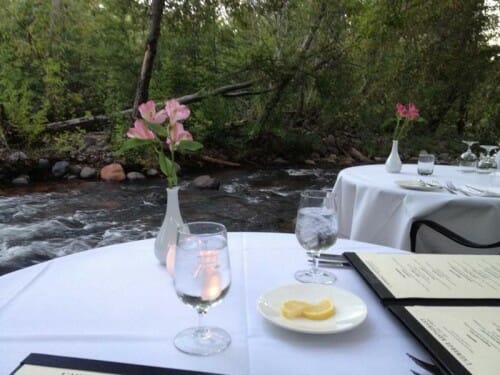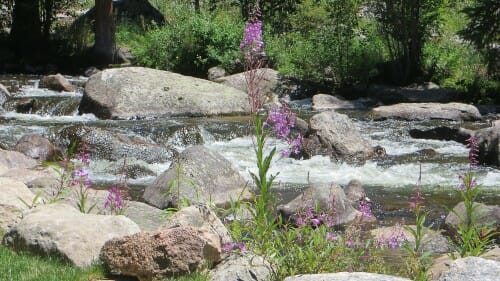Is the Forest Service Requiring Permits for Photography? Yes and No.
A follow-up to this article is here.
The news has been zooming around the Internet that the US Forest Service (USFS) is going to require permits to take pictures on public lands. It was the first I had heard of this, which is odd in one sense because I actually operate tens of thousands of acres of US Forest Service lands, and in fact operate the ones with the most visitation (on the other hand, we are often the last to hear anything from the USFS).
So, knowing that the Internet can be a huge game of "telephone" where messages quickly get garbled, I went to the regulation itself. As usual, that did not help much, because it is so freaking hard to parse. Reading between the lines, here is what I think is going on:
- The regulations don't apply to all USFS lands, but to the federally-designated wilderness areas they manage. Even this is confusing, since the permitting authority does not apply just to wilderness areas, but to anywhere in the USFS. But even the wilderness areas constitute a lot of land, and often the most scenic.
- Apparently, the regulations have been in place for 4 years and this is just an extension and clarification
- Ostensibly, the regulations apply only to commercial filming, but how the USFS is going to distinguish between a commercial photographer and well-equipped amateur, I have no idea. The distinction seems to lie in what the photography will be used for, and since this use happens long after the individuals have left the land, I am not sure how the USFS will figure this out. Is the US Government going to start suing magazines for nature pictures, claiming a copyright on the scenery? What happens if I take it for my own use, then discover I have an awesome picture and decide to sell it. It is hard to write laws that depend on reading people's minds in determining if an act is legal.
The Federal Wilderness Act gives the government a lot of power to limit uses in a designated wilderness area. Motorized vehicles and tools are banned, as were bicycles more recently. My company operates in only one wilderness area, a canoe run at the Juniper Springs recreation area in Florida. If a tree falls across the stream, we have to float down in canoes and take it out with hand axes. We have to open and inspect coolers of those going down the run to make sure no banned items are in them. In other words, wilderness areas definitely have a higher level of restrictions than the average public land.
As to the First Amendment issues, well folks like Ken White at Popehat have taught me that it is very very dangerous for the uniformed (ie me) to pontificate on complex First Amendment issues. I am sure the USFS would say that they are not interfering with free expression, just banning a use that could be dangerous in the wilderness. There are a few problems with this:
- The USFS hasn't explained why taking pictures threatens the natural operation of ecosystems
- The USFS has undermined their own argument by making exceptions based on the purpose of the filming. Apparently only commercial filming hurts ecosystems, not amateur photography. And apparently commercial filming that has positive messages about the USFS are OK too. Its just commercial filming that goes into a beer company ad that hurts ecosystems. You see the problem. If it's the use itself that is the problem, then the USFS should be banning the use altogether. By banning some photography but not all based on the content and use of that photography, that strikes me as a first amendment issue.The best parallel I can think of is in Venezuela. There, the government claimed a paper shortage required it to shut down certain printing to conserve paper, and then proceeded to shut down only the newspapers it did not like. I suppose it could claim that it was not censoring anyone, just taking steps to deal with the newsprint shortage. Similarly the USFS claims it is not limiting anyone's first amendment rights, it is just protecting the wilderness form a dangerous use.
A few years ago, the USFS tried to reverse an expensive mistake it had made. The US government issues lifetime senior passes that allow free entry and half off camping for seniors. This is an expensive giveaway, paid for by taxpayers. But the USFS had gone further, requiring that concessionaires like our company also accept the pass and give half off to seniors. While giving half off to seniors at government-run campgrounds had to be funded by taxpayers, concessionaires only have use fees to fund operations. So to give half off to seniors, prices have to be raised to everyone else. The senior discount requirement was raising prices (and still does) $4-$5 a night for every other camper.
Well, long story short (too late!) the US Forest Service folded under the organized pressure of senior groups. And my guess is that they will do so again here. Unlike with the National Park Service which has a clear mandate and strong public support, few people get misty-eyed about the USFS, which means they are always sensitive to bad news that might hurt them in the next budget fight.
PS -- Is someone going to go back and bill Ansel Adams' estate? Isn't he exactly the sort of commercial nature photographer that this rule is aimed at?
Update: I have talked to a number of people in the know on this. Apparently what began as a desire merely to stop high impact filming in the wilderness -- full Hollywood movie sets with catering trucks, etc. -- has gotten taken over by a large group in the USFS that is at best skeptical and at worst hostile to commercial activity. They would explain these rules, at least in private, by saying that anything commercial is by definition antithetical to the very concept of wilderness that they hold in their heads, and that thus all commercial activity needs to be banned in the wilderness because it is inherently corrupting.






